a&e features
‘Boys Don’t Cry’ at 20: rethinking trans actors
Cis actress Hilary Swank won the Oscar playing a trans man but would it happen today?
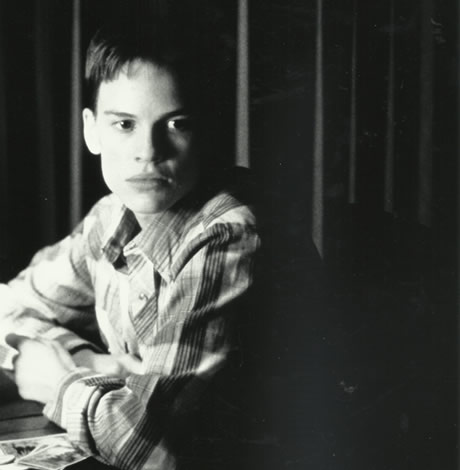
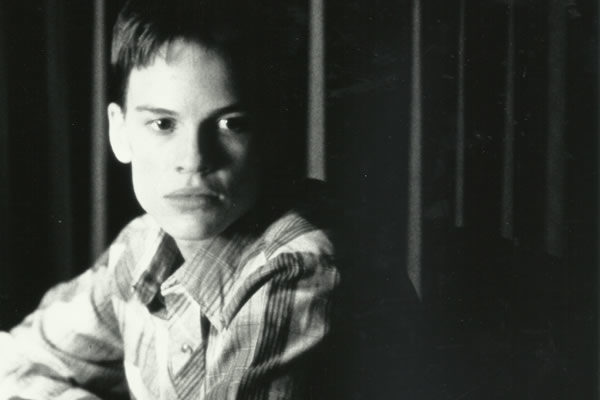
It’s been 20 years ago this month since the release of “Boys Don’t Cry,” the Fox Searchlight movie that depicted the true story of Brandon Teena, a trans man played by Hilary Swank, who adopts a male identity in Nebraska but is murdered in a hate crime.
Directed by Kimberly Peirce, whose interest was piqued by a 1994 Village Voice article about Teena, the film was made for $2 million and made $20 million at the box office. It premiered Oct. 8, 1999 at the New York Film Festival and went into wider release later in the month.
Swank won a bounty of awards for the role including prizes from the New York Film Critics Circle, the Chicago Film Critics, the Boston Society of Film Critics, the Independent Spirit Award, the Golden Globe and the Oscar. It was both widely praised in reviews at the time and holds an 88 percent fresh rating on Rotten Tomatoes.
It’s unlikely, though, that Swank would get cast in the role were it made today. With trans actresses Mj Rodriguez, Indya Moore, Dominique Jackson, Hailie Sahar and Angelica Ross having been cast on the Ryan Murphy FX drama “Pose,” and Scarlett Johansson all but forced to withdraw last year from her planned movie “Rub & Tug” (she was to play a trans character based on Dante Gill, who ran massage parlors in the ‘70s and ‘80s that were brothel fronts) after a backlash ensued, many say it’s a new day for trans actors. Of Johansson, trans actress Trace Lysette (Shea on “Transparent”) wrote on Twitter, “Not only do you play us and steal our narrative and our opportunity but you pat yourselves on the back with trophies and accolades for mimicking what we have lived.”
Cisgender backlash
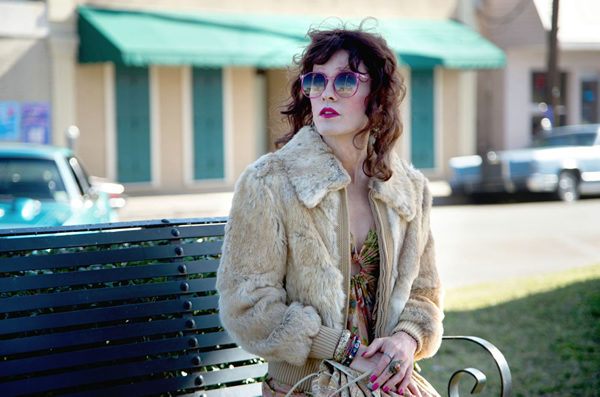
Elle Fanning drew ire the year before for being cast in “3 Generations” as Ray, a female-to-male trans teen. A groundswell had been building with actors like Matt Bomer in “Anything” (2017), Eddie Redmayne in “The Danish Girl” (2015) and Jared Leto in “Dallas Buyers Club” (2013) drawing muted but present backlash.
Conversely, on TV, trans actress Candis Cayne earned the distinction of being the first trans actress to play a recurring trans character on a primetime show when she played Carmelita on ABC’s short-lived “Dirty Sexy Money” (2007-2009). Trans actress Nicole Maines plays the first trans superhero as Dreamer/NiaNal on The CW’s “Supergirl.” In its latest report, GLAAD says there are 26 trans characters currently on TV, vs. 17 in its previous report.
Leto ended up winning a Best Supporting Actor Oscar for his role. Redmayne won the Best Actor Oscar for his and back in 2005, Felicity Huffman was nominated for playing trans in “Transamerica.” A trend was clearly at play — playing trans is Oscar catnip for cisgender actors.
That’s a problem, working trans actors today say.
“The Academy seems to see it as some heroic transformation, but is it any more a feat of acting than what, say, Daniel Day-Lewis did as Lincoln, or any number of great performances you could name,” says Samy Nour Younes, a trans male stage and screen actor in New York. “Beyond the fact that they’re playing another gender identity, the roles are usually not that good. If you watch ‘Boys Don’t Cry,’ ‘Transamerica’ or ‘Dallas Buyers Club,’ which is the worst among them, they’re not particularly well written characters period, not because they assumed a marginalized identity, but we think there’s something inherently taboo or exotic, but in a stigmatized kind of way, about it. Like, ‘Oh, you’re so brave, you deserve an Oscar,’ when it actually wasn’t that great.”
Younes says “Transparent,” the hit 2014-2019 (it just wrapped with a musical finale on Amazon Prime Video Sept. 27) show on which he guested twice in its fourth season, was a game changer just before “Pose” hit big. Although cis actor Jeffrey Tambor played Maura, a retired college professor who comes out as trans, creator Jill Soloway enacted a “transfirmative action program” for the show (cast and crew) where trans applicants were hired in preference to cis applicants. Tambor (“The Larry Sanders Show,” “Arrested Development”) left the show in late 2017 amid sexual misconduct allegations.
“Just letting trans people in the room — directors, writers, consultants — makes a huge difference,” Younes says. “That’s when we start getting layered and nuanced characters that tell stories beyond their transitions, with interesting people. We’re seeing less and less of a need for the Eddie Redmaynes of the world who say, ‘Oh, I did so much research,’ which I call bullshit on that because if you’d really done so much research, you’d have an understanding that we’re not just some costume you can slip on which just helps solidify the Academy’s thinking that that’s all it is and playing trans becomes a farce.”
The casting conundrum
Tammara Billik, a veteran Hollywood casting director known for her work on “Married … with Children” and the famous coming-out episode of “Ellen” in 1997, says things have come a long way since the “Boys Don’t Cry” era.
For one, she says, TV has come into a “golden age” that has “provided a lot more opportunities for all kinds of inclusive roles.”
“Not just with ‘Pose’ and ‘Transparent,’ but now there are a number of trans actors,” Billik, a lesbian, says. “I just read something about their being a trans actor in a series regular role on ‘The Politician’ with Ben Platt. I didn’t know anything about that. It’s happening without a big splash, it’s happening on weekly shows, so I think there is tremendous progress in terms of the trans actor community, particularly on TV.”
Film, she says, is different.
“When ‘Boys Don’t Cry’ came out, gosh, I don’t think I knew a trans actor at the time. … It certainly wouldn’t have been a time when a trans actor would have been cast. Now you would be hard pressed to cast that role with a cis actor,” Billik says. “You just wouldn’t do it, right?”
She says the Johansson episode was “a giant shift.”
“In both a good and bad way,” Billik says. “It’s good for the actors and a good way to show more diversity on television but we’ve also seen a backlash against particularly trans women of color. I’m not saying ‘Pose’ is responsible for it, but people get angry when you show them the truth. We’re all wondering why so many trans women of color are being targeted for violence. Is it because we’re seeing their images more on TV, is it because people have been emboldened by Trump? I don’t know the answer to that.”
It’s an issue GLAAD has been working on for years. Nick Adams and Alex Schmider, GLAAD’s Transgender Media Program team, work with TV networks, production companies, showrunners, script writers, casting directors and agencies as well as PR firms to help bring what it calls “fair and accurate representations for transgender people to the screen.”
They say things are improving dramatically.
“Hollywood is beginning to tell more accurate and well-rounded stories about transgender people and casting trans characters more authentically,” Schmider said in an e-mail comment to the Blade. “Not only are trans characters starting to be written with more nuance, complexity and humanity in the worlds in which they exist, but casting has also begun to evolve in positive ways.”
By their count, there’s only one cis actor still playing a trans role on TV.
The issue is a bit more complex, casting vets say, than “casting more authentically.” Alexa L. Fogel, casting director for “Pose” and a slew of HBO shows such as “Oz,” “The Wire,” and others, says it’s “a really complicated issue” that has multiple angles.
“TV is easier in that you’re creating characters, you’re creating roles, you’re creating stars,” she says. “In the case of ‘Pose,’ none of these people were known before. A lot of them hadn’t really acted before. These roles could be crafted around these people’s strengths to some degree, not so much in the character of Elektra, with her we had to find someone who could deliver what was on the page, and that was challenging for sure, but I think the other side of it is that certainly with films, there are certainly situations in which you need to sell tickets to things. Certain things might not get made without movie stars. These are complicated questions and I don’t know that anyone knows the answers to them all yet, but it’s a conversation.”
The decision to cast trans actors on “Pose” was made prior to Fogel’s involvement with the show. She says that added a layer to the casting process, but she didn’t see it as an extra burden.
“It’s part of the joy of the job,” says Fogel, who declined to state her own sexual orientation or gender identity. “It’s about rising to the challenge. I never considered that it couldn’t be done. It was just about, you know, doing the research, getting ambassadors to the community, making sure I had enough time to meet enough people. Anytime you do something that’s less visible, it’s more time consuming.”
How deep was the talent pool?
“I wouldn’t say it was a huge talent pool, but I’ve done a lot of projects where you just have to really put your head down and do extra research and this was one of them,” she says. “It was challenging but it never felt that it was going to be impossible. It just meant we had to do extra work.”
She’s not aware if the Screen Actors Guild tracks its members’ gender identity (SAG did not respond to requests for clarification on that). Fogel says membership is easy to secure once she casts a lead role.
Could ‘Pose’ be a fluke?
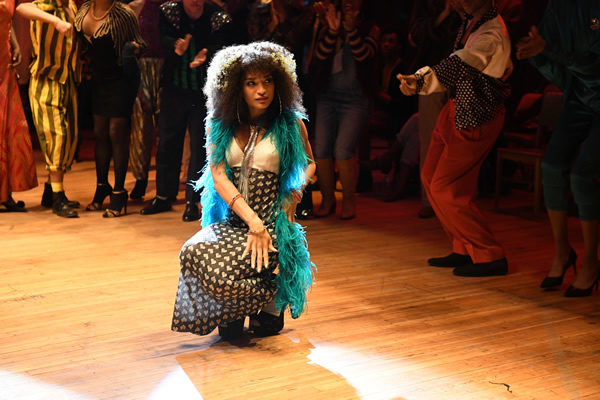
Is “Pose” a one-off or a game changer?
“I don’t have a crystal ball, but I think yeah, the ground is certainly shifting in terms of the conversation,” Fogel says. “I think it’s ultimately about the writing, about the culture and what people feel like they want to see. People want real representation and that seems to be happening across the board.”
Billik agrees.
“‘Pose’ is telling a story that’s really spectacular and a lot of people are really responding to it, so I don’t think it will be a one-off,” she says. “I think we’ll see a whole slew of trans actors cast because of it.”
Aneesh Seth, a trans actress on the Netflix show “Jessica Jones,” says there’s still “a long way to go.”
“Athough trans folks have gained some control over the types of trans narratives out there, they can still tend to be reductive and focused on our trauma,” she said in an e-mail. “Where are the stories of trans folks winning? Falling in love? Having successful marriages and careers?”
Is this the end, at least, of the big stars taking home Oscars and nominations for all the major trans movie roles? And how realistic is it — theoretically — for a trans actor to have given the caliber of performance Swank gave in “Boys Don’t Cry”?
Some say it’s a chicken-or-the-egg argument. If trans actors had been given time to build up their resumes on equal footing with a Swank or a Jared Leto, who knows what they might have achieved? That’s not to say they had easy rides — Swank and her mother, for a time, lived out of a car upon moving to Los Angeles as Swank pursued her dream. But inarguably, upon starting her acting career, she got cast in varied roles far faster and more regularly than any trans actor would have fared, especially in the ‘90s.
Fogel, especially, says it’s hard to account realistically for “what ifs.”
“You can’t really know the answer to that without doing the work,” she says. “I couldn’t have answered any of these questions about ‘Pose’ before I’d done it. The process is so important when it comes to casting. You really have to do the work to find the people, it’s all about the process.”
Looking ahead
The path ahead, many agree, is bright.
“I actually think Time magazine jumped the gun a little bit when they put Laverne Cox on the cover for ‘Orange is the New Black’ and said it was ‘The Transgender Tipping Point,’” Younes says. “Not to take anything away from her, but I think the tipping point is actually now because it’s not just one, it’s multiple roles. There’s a brand new pool of talent and we’re more open to the fact that it could come from anywhere.”
Several folks interviewed for this piece mentioned bit parts they’d seen trans actors cast in of late. Billik just saw “Moulin Rouge” on Broadway and said one of four ladies in the opening number was trans. Younes knows a trans colleague in the ensemble in “Tina: the Tina Turner Musical,” which opens at the Lunt-Fontanne Theatre on Broadway next month (previews are in October). He also cites two trans actors with brief speaking parts in this summer’s “Spider Man: Far From Home.”
GLAAD reps helped cast Zoey Luna, a trans Latina actress, in “The Craft” reboot from Sony as Lourdes, one of the lead girls in the coven who happens to be trans. In 2018, not one of the 110 major studio films released included a trans character, according to GLAAD.
“So this casting and character are game changers in the film landscape,” Schmider says.
Non-binary actor Asia Kate Dillon on Showtimes “Billions,” is another positive step, many agree. And Daniela Vega made history in “Fantastic Woman,” a 2017 Chilean drama that won an Oscar. Vega was the first trans presenter in the history of the Academy Awards when she presented in 2018.
“This isn’t a trend, this isn’t just the topic du jour,” Younes says. “For decades, all we could get were playing the dead hooker on ‘Law & Order: SVU.’ … I hope it’s a continuing trend for trans people making inroads in entertainment.”
SIDEBAR: ‘Boys Don’t Cry’: problematic in retrospect?
Although it was seen as fairly groundbreaking in its day, the 1999 film “Boys Don’t Cry” hasn’t aged particularly well, some argue.
Donna Minkowitz, the writer of the original Village Voice story that inspired the movie, apologized last year in a piece she wrote (also for the Voice) called “How I broke, and botched, the Brandon Teena Story.”
“For years, I have wanted to apologize for what I now understand, with some shame, was the article’s implicit anti-trans framing,” Minkowitz wrote. “Without spelling it out, the article cast Brandon as a lesbian who hated ‘her’ body because of prior experiences of childhood sexual abuse and rape. … At the time, I was extremely ignorant about trans people. Like many other cis queer people at the time, I didn’t know that there were gay trans men, trans lesbians, bisexual trans folks, that being trans had nothing to do with whether you were straight or gay, and that trans activism was not, as some of us feared, an effort to stave off queerness and lead ‘easier,’ more conventional heterosexual lives.”
The trope of the butch lesbian who takes things “just a little too far” and comes out as trans, is a recurring one, trans actor Samy Nour Younes says. He, too, found the film adaptation “problematic.”
“There was a similar storyline on ‘The L Word,’ when Max Sweeney starts taking hormones and becomes this raging monster, a really awful storyline. Seeing some of those things and ‘Boys Don’t Cry’ were the first representations I saw of a trans masculine storyline and stopped me from coming out sooner.”
a&e features
Visit Cambridge, a ‘beautiful secret’ on Maryland’s Eastern Shore
New organization promotes town’s welcoming vibe, LGBTQ inclusion

CAMBRIDGE, Md. — Driving through this scenic, historic town on Maryland’s Eastern Shore, you’ll be charmed by streets lined with unique shops, restaurants, and beautifully restored Victorian homes. You’ll also be struck by the number of LGBTQ Pride flags flying throughout the town.
The flags are a reassuring signal that everyone is welcome here, despite the town’s location in ruby red Dorchester County, which voted for Donald Trump over Kamala Harris by a lopsided margin. But don’t let that deter you from visiting. A new organization, Proudly Cambridge, is holding its debut Pride event this weekend, touting the town’s welcoming, inclusive culture.
“We stumbled on a beautiful secret and we wanted to help get the word out,” said James Lumalcuri of the effort to create Proudly Cambridge.
The organization celebrates diversity, enhances public spaces, and seeks to uplift all that Cambridge has to share, according to its mission statement, under the tagline “You Belong Here.”
The group has so far held informal movie nights and a picnic and garden party; the launch party is June 28 at the Cambridge Yacht Club, which will feature a Pride celebration and tea dance. The event’s 75 tickets sold out quickly and proceeds benefit DoCo Pride.
“Tickets went faster than we imagined and we’re bummed we can’t welcome everyone who wanted to come,” Lumalcuri said, adding that organizers plan to make “Cheers on the Choptank” an annual event with added capacity next year.
One of the group’s first projects was to distribute free Pride flags to anyone who requested one and the result is a visually striking display of a large number of flags flying all over town. Up next: Proudly Cambridge plans to roll out a program offering affirming businesses rainbow crab stickers to show their inclusiveness and LGBTQ support. The group also wants to engage with potential visitors and homebuyers.
“We want to spread the word outside of Cambridge — in D.C. and Baltimore — who don’t know about Cambridge,” Lumalcuri said. “We want them to come and know we are a safe haven. You can exist here and feel comfortable and supported by neighbors in a way that we didn’t anticipate when we moved here.”

Lumalcuri, 53, a federal government employee, and his husband, Lou Cardenas, 62, a Realtor, purchased a Victorian house in Cambridge in 2021 and embarked on an extensive renovation. The couple also owns a home in Adams Morgan in D.C.
“We saw the opportunity here and wanted to share it with others,” Cardenas said. “There’s lots of housing inventory in the $300-400,000 range … we’re not here to gentrify people out of town because a lot of these homes are just empty and need to be fixed up and we’re happy to be a part of that.”
Lumalcuri was talking with friends one Sunday last year at the gazebo (affectionately known as the “gayzebo” by locals) at the Yacht Club and the idea for Proudly Cambridge was born. The founding board members are Lumalcuri, Corey van Vlymen, Brian Orjuela, Lauren Mross, and Caleb Holland. The group is currently working toward forming a 501(c)3.
“We need visibility and support for those who need it,” Mross said. “We started making lists of what we wanted to do and the five of us ran with it. We started meeting weekly and solidified what we wanted to do.”
Mross, 50, a brand strategist and web designer, moved to Cambridge from Atlanta with her wife three years ago. They knew they wanted to be near the water and farther north and began researching their options when they discovered Cambridge.
“I had not heard of Cambridge but the location seemed perfect,” she said. “I pointed on a map and said this is where we’re going to move.”
The couple packed up, bought a camper trailer and parked it in different campsites but kept coming back to Cambridge.
“I didn’t know how right it was until we moved here,” she said. “It’s the most welcoming place … there’s an energy vortex here – how did so many cool, progressive people end up in one place?”
Corey van Vlymen and his husband live in D.C. and were looking for a second home. They considered Lost River, W.Va., but decided they preferred to be on the water.
“We looked at a map on both sides of the bay and came to Cambridge on a Saturday and bought a house that day,” said van Vlymen, 39, a senior scientist at Booz Allen Hamilton. They’ve owned in Cambridge for two years.
They were drawn to Cambridge due to its location on the water, the affordable housing inventory, and its proximity to D.C.; it’s about an hour and 20 minutes away.
Now, through the work of Proudly Cambridge, they hope to highlight the town’s many attributes to residents and visitors alike.
“Something we all agree on is there’s a perception problem for Cambridge and a lack of awareness,” van Vlymen said. “If you tell someone you’re going to Cambridge, chances are they think, ‘England or Massachusetts?’”
He cited the affordability and the opportunity to save older, historic homes as a big draw for buyers.
“It’s all about celebrating all the things that make Cambridge great,” Mross added. “Our monthly social events are joyful and celebratory.” A recent game night drew about 70 people.
She noted that the goal is not to gentrify the town and push longtime residents out, but to uplift all the people who are already there while welcoming new visitors and future residents.
They also noted that Proudly Cambridge does not seek to supplant existing Pride-focused organizations. Dorchester County Pride organizes countywide Pride events and Delmarva Pride was held in nearby Easton two weeks ago.
“We celebrate all diversity but are gay powered and gay led,” Mross noted.
To learn more about Proudly Cambridge, visit the group on Facebook and Instagram.
What to see and do
Cambridge, located 13 miles up the Choptank River from the Chesapeake Bay, has a population of roughly 15,000. It was settled in 1684 and named for the English university town in 1686. It is home to the Harriet Tubman Museum, mural, and monument. Its proximity to the Blackwater National Wildlife Refuge makes it a popular stop for birders, drawn to more than 27,000 acres of marshland dubbed “the Everglades of the north.”
The refuge is walkable, bikeable, and driveable, making it an accessible attraction for all. There are kayaking and biking tours through Blackwater Adventures (blackwateradventuresmd.com).
Back in town, take a stroll along the water and through historic downtown and admire the architecture. Take in the striking Harriet Tubman mural (424 Race St.). Shop in the many local boutiques, and don’t miss the gay-owned Shorelife Home and Gifts (421 Race St.), filled with stylish coastal décor items.
Stop for breakfast or lunch at Black Water Bakery (429 Race St.), which offers a full compliment of coffee drinks along with a build-your-own mimosa bar and a full menu of creative cocktails.
The Cambridge Yacht Club (1 Mill St.) is always bustling but you need to be a member to get in. Snapper’s on the water is temporarily closed for renovations. RaR Brewing (rarbrewing.com) is popular for craft beers served in an 80-year-old former pool hall and bowling alley. The menu offers burgers, wings, and other bar fare.
For dinner or wine, don’t miss the fantastic Vintage 414 (414 Race St.), which offers lunch, dinner, wine tasting events, specialty foods, and a large selection of wines. The homemade cheddar crackers, inventive flatbreads, and creative desserts (citrus olive oil cake, carrot cake trifle) were a hit on a recent visit.
Also nearby is Ava’s (305 High St.), a regional chain offering outstanding Italian dishes, pizzas, and more.
For something off the beaten path, visit Emily’s Produce (22143 Church Creek Rd.) for its nursery, produce, and prepared meals.
“Ten minutes into the sticks there’s a place called Emily’s Produce, where you can pay $5 and walk through a field and pick sunflowers, blueberries, you can feed the goats … and they have great food,” van Vlymen said.
As for accommodations, there’s the Hyatt Regency Chesapeake Bay (100 Heron Blvd. at Route 50), a resort complex with golf course, spa, and marina. Otherwise, check out Airbnb and VRBO for short-term rentals closer to downtown.
Its proximity to D.C. and Baltimore makes Cambridge an ideal weekend getaway. The large LGBTQ population is welcoming and they are happy to talk up their town and show you around.
“There’s a closeness among the neighbors that I wasn’t feeling in D.C.,” Lumalcuri said. “We look after each other.”
a&e features
James Baldwin bio shows how much of his life is revealed in his work
‘A Love Story’ is first major book on acclaimed author’s life in 30 years

‘Baldwin: A Love Story’
By Nicholas Boggs
c.2025, FSG
$35/704 pages
“Baldwin: A Love Story” is a sympathetic biography, the first major one in 30 years, of acclaimed Black gay writer James Baldwin. Drawing on Baldwin’s fiction, essays, and letters, Nicolas Boggs, a white writer who rediscovered and co-edited a new edition of a long-lost Baldwin book, explores Baldwin’s life and work through focusing on his lovers, mentors, and inspirations.
The book begins with a quick look at Baldwin’s childhood in Harlem, and his difficult relationship with his religious, angry stepfather. Baldwin’s experience with Orilla Miller, a white teacher who encouraged the boy’s writing and took him to plays and movies, even against his father’s wishes, helped shape his life and tempered his feelings toward white people. When Baldwin later joined a church and became a child preacher, though, he felt conflicted between academic success and religious demands, even denouncing Miller at one point. In a fascinating late essay, Baldwin also described his teenage sexual relationship with a mobster, who showed him off in public.
Baldwin’s romantic life was complicated, as he preferred men who were not outwardly gay. Indeed, many would marry women and have children while also involved with Baldwin. Still, they would often remain friends and enabled Baldwin’s work. Lucien Happersberger, who met Baldwin while both were living in Paris, sent him to a Swiss village, where he wrote his first novel, “Go Tell It on the Mountain,” as well as an essay, “Stranger in the Village,” about the oddness of being the first Black person many villagers had ever seen. Baldwin met Turkish actor Engin Cezzar in New York at the Actors’ Studio; Baldwin later spent time in Istanbul with Cezzar and his wife, finishing “Another Country” and directing a controversial play about Turkish prisoners that depicted sexuality and gender.
Baldwin collaborated with French artist Yoran Cazac on a children’s book, which later vanished. Boggs writes of his excitement about coming across this book while a student at Yale and how he later interviewed Cazac and his wife while also republishing the book. Baldwin also had many tumultuous sexual relationships with young men whom he tried to mentor and shape, most of which led to drama and despair.
The book carefully examines Baldwin’s development as a writer. “Go Tell It on the Mountain” draws heavily on his early life, giving subtle signs of the main character John’s sexuality, while “Giovanni’s Room” bravely and openly shows a homosexual relationship, highly controversial at the time. “If Beale Street Could Talk” features a woman as its main character and narrator, the first time Baldwin wrote fully through a woman’s perspective. His essays feel deeply personal, even if they do not reveal everything; Lucian is the unnamed visiting friend in one who the police briefly detained along with Baldwin. He found New York too distracting to write, spending his time there with friends and family or on business. He was close friends with modernist painter Beauford Delaney, also gay, who helped Baldwin see that a Black man could thrive as an artist. Delaney would later move to France, staying near Baldwin’s home.
An epilogue has Boggs writing about encountering Baldwin’s work as one of the few white students in a majority-Black school. It helpfully reminds us that Baldwin connects to all who feel different, no matter their race, sexuality, gender, or class. A well-written, easy-flowing biography, with many excerpts from Baldwin’s writing, it shows how much of his life is revealed in his work. Let’s hope it encourages reading the work, either again or for the first time.
a&e features
Looking back at 50 years of Pride in D.C
Washington Blade’s unique archives chronicle highs, lows of our movement
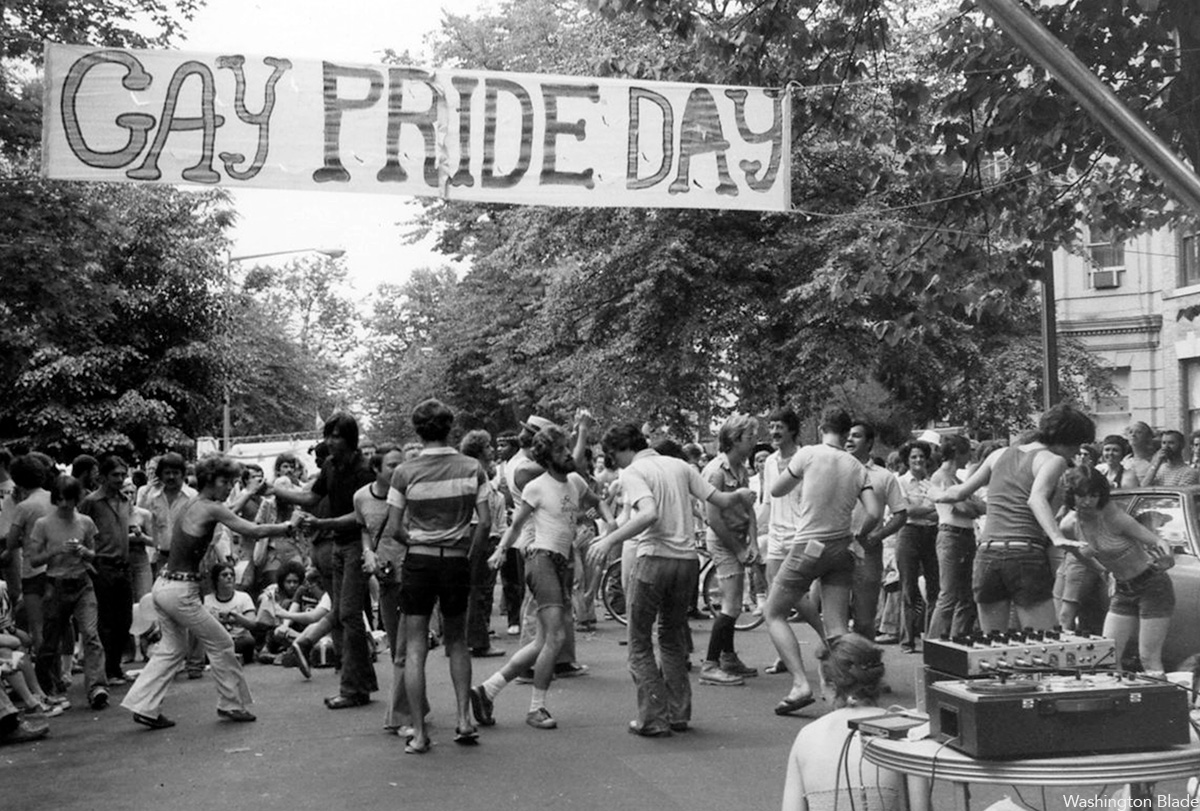
To celebrate the 50th anniversary of LGBTQ Pride in Washington, D.C., the Washington Blade team combed our archives and put together a glossy magazine showcasing five decades of celebrations in the city. Below is a sampling of images from the magazine but be sure to find a print copy starting this week.
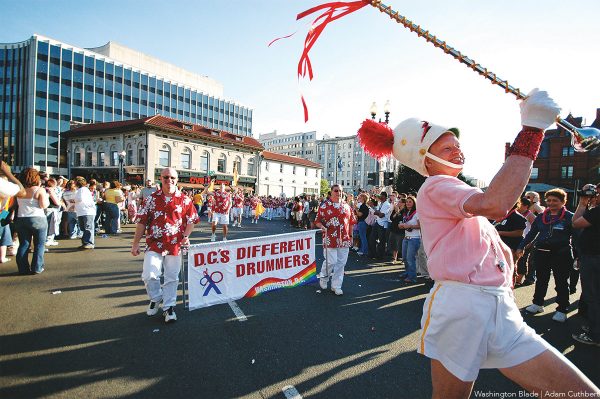
The magazine is being distributed now and is complimentary. You can find copies at LGBTQ bars and restaurants across the city. Or visit the Blade booth at the Pride festival on June 7 and 8 where we will distribute copies.
Thank you to our advertisers and sponsors, whose support has enabled us to distribute the magazine free of charge. And thanks to our dedicated team at the Blade, especially Photo Editor Michael Key, who spent many hours searching the archives for the best images, many of which are unique to the Blade and cannot be found elsewhere. And thanks to our dynamic production team of Meaghan Juba, who designed the magazine, and Phil Rockstroh who managed the process. Stephen Rutgers and Brian Pitts handled sales and marketing and staff writers Lou Chibbaro Jr., Christopher Kane, Michael K. Lavers, Joe Reberkenny along with freelancer and former Blade staffer Joey DiGuglielmo wrote the essays.

The magazine represents more than 50 years of hard work by countless reporters, editors, advertising sales reps, photographers, and other media professionals who have brought you the Washington Blade since 1969.
We hope you enjoy the magazine and keep it as a reminder of all the many ups and downs our local LGBTQ community has experienced over the past 50 years.
I hope you will consider supporting our vital mission by becoming a Blade member today. At a time when reliable, accurate LGBTQ news is more essential than ever, your contribution helps make it possible. With a monthly gift starting at just $7, you’ll ensure that the Blade remains a trusted, free resource for the community — now and for years to come. Click here to help fund LGBTQ journalism.
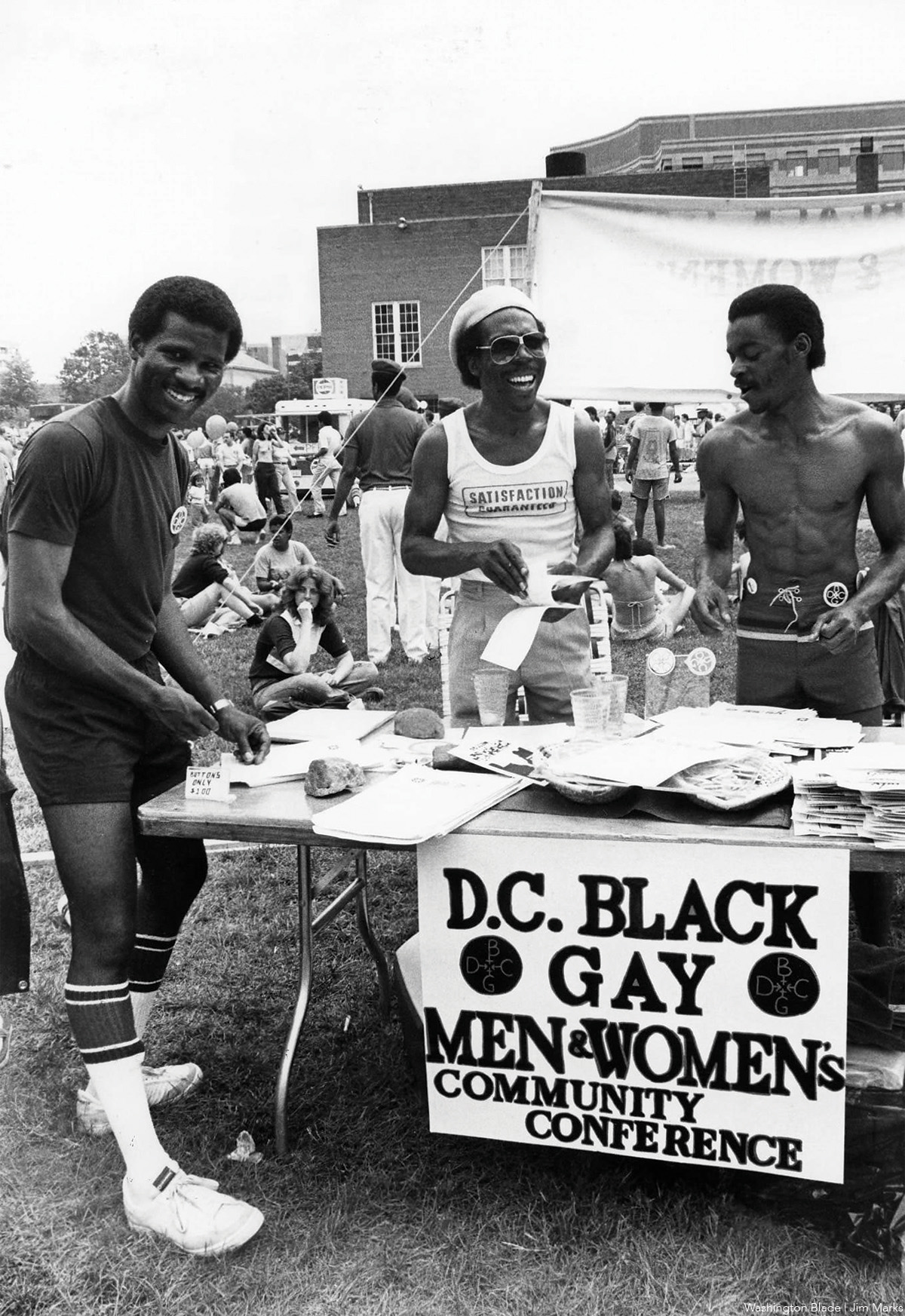
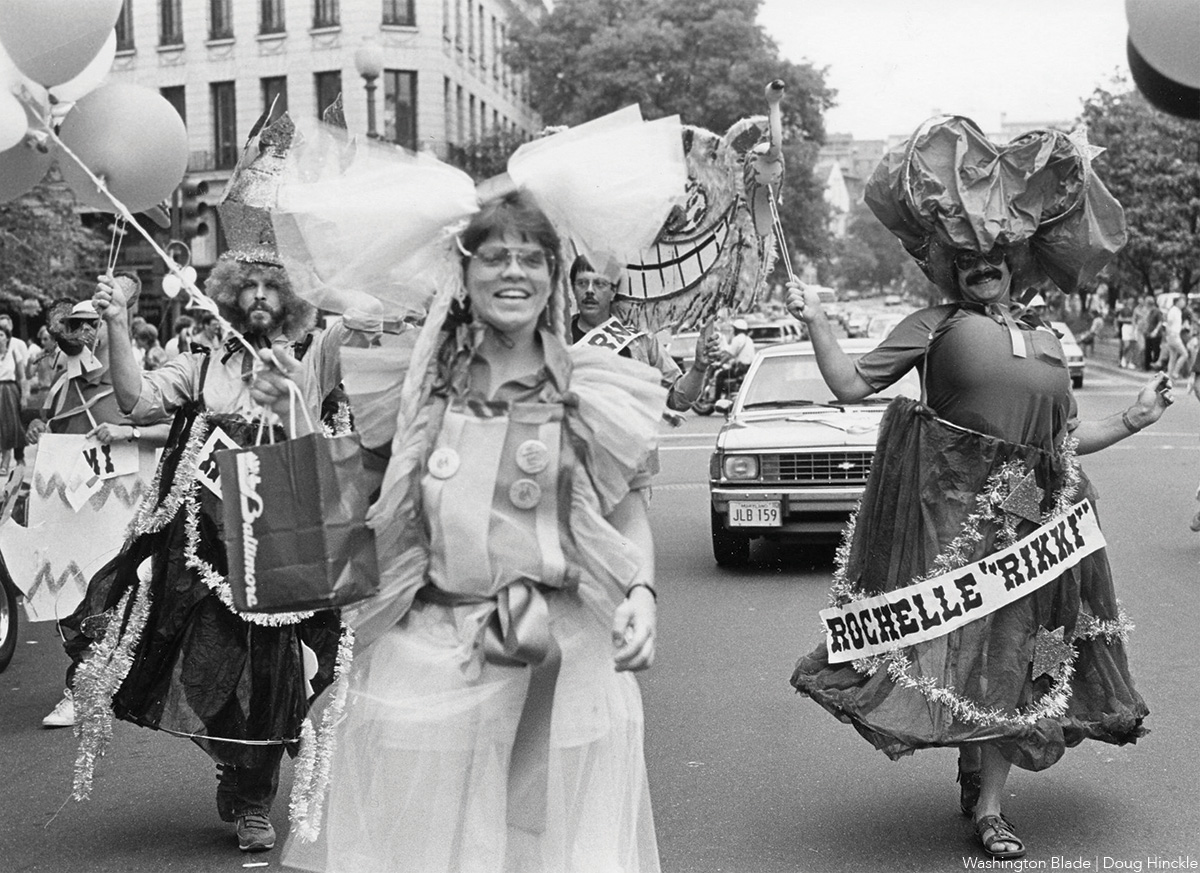

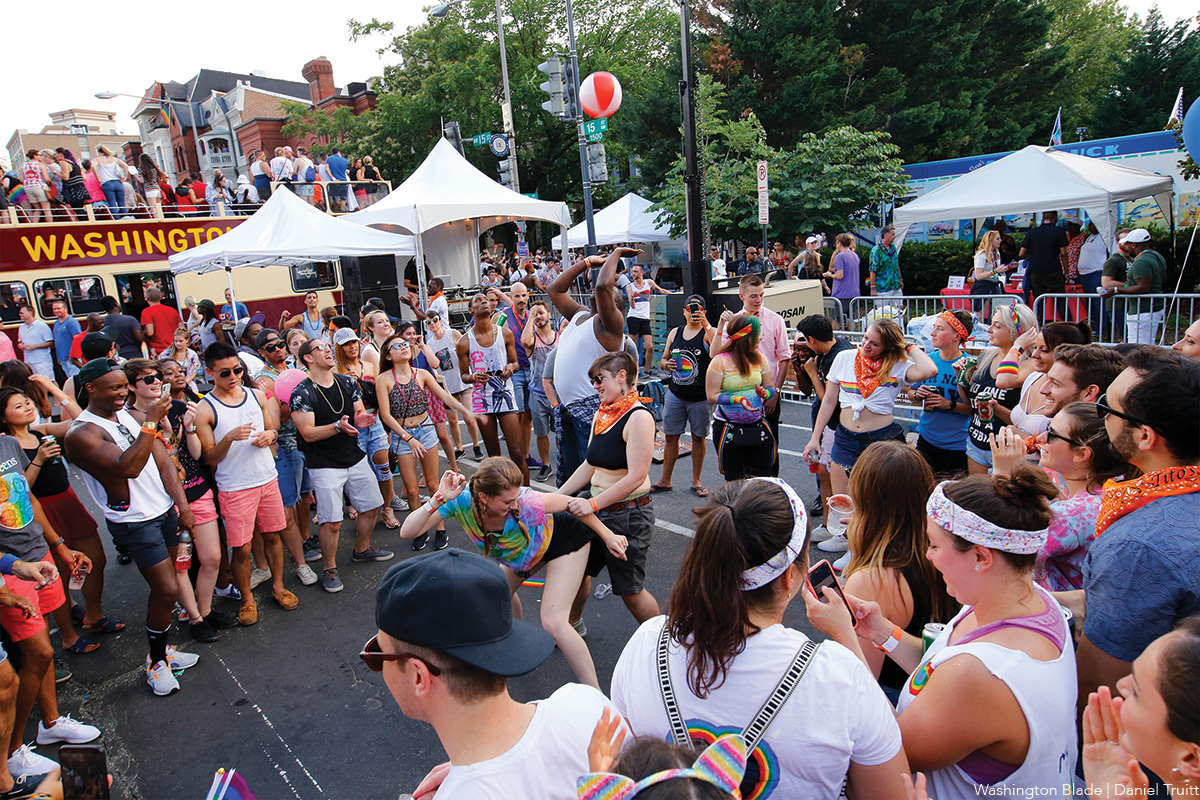
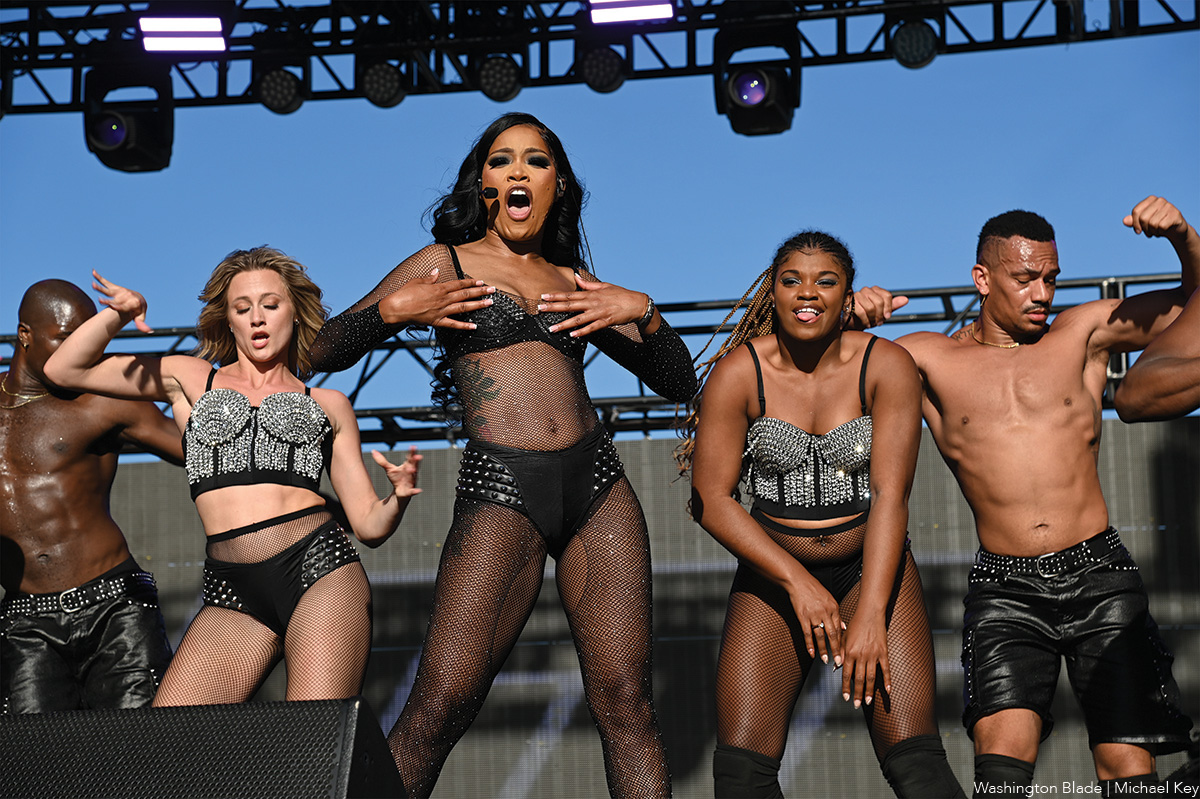
-

 U.S. Supreme Court3 days ago
U.S. Supreme Court3 days agoSupreme Court upholds ACA rule that makes PrEP, other preventative care free
-

 U.S. Supreme Court3 days ago
U.S. Supreme Court3 days agoSupreme Court rules parents must have option to opt children out of LGBTQ-specific lessons
-

 India5 days ago
India5 days agoIndian court rules a transgender woman is a woman
-

 National4 days ago
National4 days agoEvan Wolfson on the 10-year legacy of marriage equality










